The %yield of ammonia as a function of time in the reaction N2(g)+3H2(g)⇔2NH3(g).ΔH<0at(p,T1) is given below. If this reaction is conducted at (P1T2), with T2>T1 the % yield of ammonia as a function of time is represented by
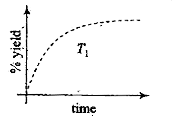 Solution in Malayalam
Solution in Malayalam
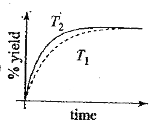
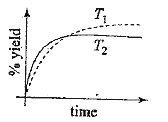
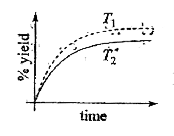
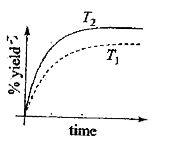
The correct Answer is:C
N2(g)+3H2(g)⇔2NH3ΔH<0 (exothermic) . For exothermic reaction, high temperature favours the reaction in backwrd direction ie. Yield of reaction decreases.
Similar Questions
The % yield of ammonia as a function of time in the reaction, N_(2)(g)+3H_(2)(g)hArr2NH_(3)(g)'DeltaHlt0 at (p,T_(1)) is given below If this reaction is conducted at (p,T_(1)) , with T_(2)gtT_(1) the % yield by of ammonia as a function of time is represented by
View SolutionThe percentage yield of ammonia is a function of time in the reaction N2(g)+3H2(g)⇔2NH3(g),△H<0
at (pT1) is given below
If this reaction is conducted (p1T1) with T2>T1, the percentage yeild of ammonia as a function of time is represented by.
View SolutionIf T1 is the period of the function f(x)=e3x−[x]andT2 is the period of the function g(x)=e3−[x]([⋅] denotes the greatest integer function ), then (a) T1=T2 (b) T1=T23 (c) T1=3T2 (d) None of these
View SolutionFor a reaction A to P , the plots of [A] and [P] with time at temperatures T_(1) and T_(2) are given below. If T_(1) gt T_(2) , the correct statements is (are): (Assume DeltaH^(Theta) and DeltaS^(Theta) are independent of temperature and ratio of ln K at T_(1) to ln K at T_(2) is greater than T_(2)/T_(1) . Here H,S,G and K are enthalpy, entropy, Gibbs energy and equilibrium constant, respectively).
View SolutionThe prepation of SO_(3)(g) by reaction SO_(2)(g)+(1)/(2)O_(2)(g)hArrSO_(3)(g) is an exothermic reaction .If the preparation follows the following temperature -pressure relationship for % yield , then for temperatures T_(1),T_(2)andT_(3) the correct option is:
View SolutionGiven that, NH _(3 (g)) + 3 Cl _(2 (g)) hArr NCl _(3 (g)) + 3 HCl _((g)) , - Delta H _(1) N_(2(g)) + 3 H _(2 (g)) hArr 2 NH _(3 (g)) ,- Delta H _(2) H _(2 (g)) + Cl _(2 (g)) hArr 2 HCl _((g)) , Delta H _(3) The enthalpy of formation fo NCl _(3 (g)) in terms of Delta H _(1) , DeltaH _(2) and Delta H _(3) is
View SolutionGiven: N _(2) (g) + 3 H _(2) (g) hArr 2 NH _3) (g) , K _(1) N _(2) g + O _(2) (g) + O _(2) (g) hArr 2 NO (g) , K _(2) , H _(2) (g) + (1)/(2) O _(2) hArr H _(2) O (g) , K _(3) The equilibrium constant for 2 NH _(3) (g) + (5)/(2) O _(2) (g) hArr 2 NO (g) + 3 H _(2) O (g) will be
View Solution
